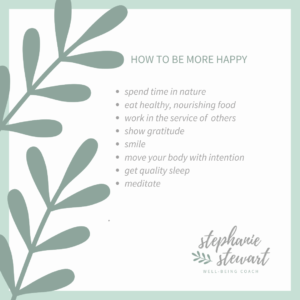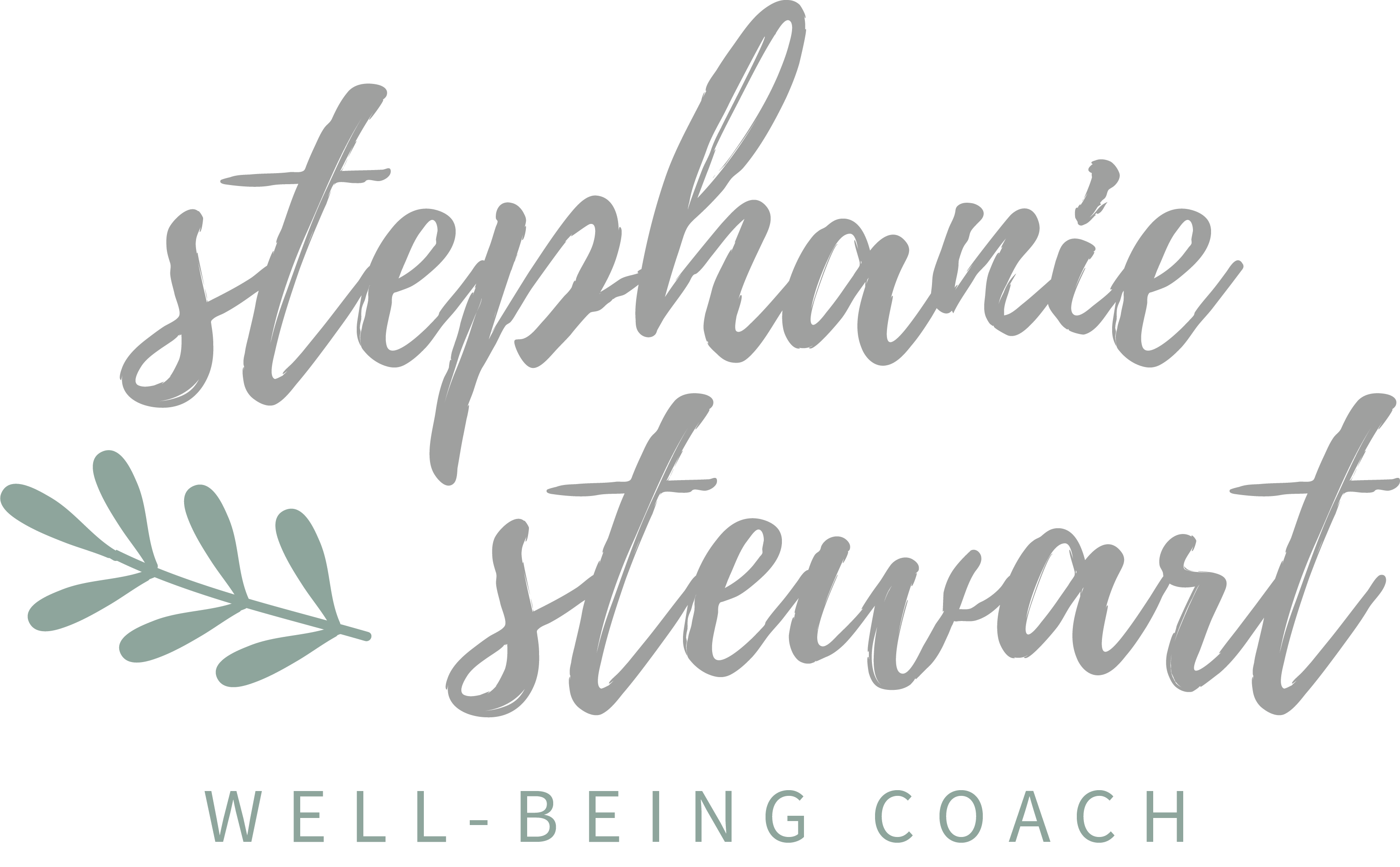
Spending Time In Nature
The world is an unbelievably beautiful place. Mother nature is magnificent and giving and incredibly resilient. So, my friend, are you. But, sometimes I forget that about myself. You too? Spending time in nature renews my perspective and helps me see past my own self. It also calms anxiety and stress. In this way, I am able to see that I am part of a much greater whole and that elevates me.
In well-being coaching, we call these kinds of experiences self-transcendence. When we “get above” our petty struggles and worries, we are able to see more clearly the path forward. And we are able to see our own magnificence, generosity, and resiliency. This leads to a more peaceful, satisfying, happy life.
Today, I will give you some tips on how to get out of your head and into your body…outside! The best way out of anxious and overwhelming feelings is through the body. Movement, stretching, massage, acupressure, breath – these are all great ways to tune into and take care of your body. Spending time in nature is one of my personal favorites because it widens my gaze, allows me to take more in with my senses, and renews hope.
Why don’t we do it?
It is important to create some awareness around the obstacles that are present for us around taking care of ourselves. The most common things people say about why they don’t engage in outdoor activity or exercise are lack of time and lack of energy. Let’s explore this a little more.
Mindfulness creates time
How does mindfulness create time? Well, when we examine truthfully how we are spending our time we will more than likely see that much of our day is taken up by mindless activity. Scrolling through social media feeds, reading all the comments on an inflammatory post, reading and re-reading the news, and binge watching television just to name a few. When my clients take the time to really look at how they are spending their day, they find that they have a lot of time they didn’t know they had.
So, for the next few days, without trying to change anything about your current routine, pay attention to where your time is going. You can do this by spending a few minutes each evening and doing a retrospective awareness exercise on your day. Start by recalling what you did when you woke up and so on. Be honest about how much you engaged in activities that ended up being more of a time suck. Do you notice patterns? Anywhere that you could insert some time for mindful self care?
Fresh air gives us energy
When we are spending time in nature we awaken our senses. Fresh air in the lungs, a breeze on our face, sunshine on your skin, crisp smells in the air, birds chirping – this is activating. Especially when we are intentional about being aware. In other words, if you are spending time in nature with the intention of getting connected to your senses and the beauty that surrounds you, that is what you will do.
This can be done while walking, hiking, running, stretching, or simply sitting. Whatever you enjoy doing outdoors is up to you. By adding intention with your time spent you will find yourself energized, refreshed, with a more unified perspective.
Union with Nature
In well-being coaching, we utilize several meditations designed to calm the thoughts, tune into the body, and create awareness. One of them is called Union with Nature. For more on coaching and how you can get started, fill out the contact form to schedule a pre-session. It would be my honor to talk with you while you discover if this is right for you.
In the union with nature meditation, we focus on opening each of the five senses, slowly and with intention. This helps gives our mind a break from worry and puts us back in our body. During times of stress, many of us experience swirling thoughts that lead to feelings of anxiety. This typically shows up in our bodies in one or a combination of ways. Racing heartbeat, headache, fatigue, upset stomach, heaviness in the chest, restriction in the throat, etc. This is uncomfortable and exhausting.
If we don’t build some muscle memory around using the body to decrease these physical feelings we wind up stuck in our thoughts. If you have ever been in a heightened state of anxiety, you know you cannot think yourself out of it.
Get some fresh air
As prevention and in overwhelming moments, getting fresh air and breathing it in fully does wonders for the body and the mind. It is immediate relief for stress. It’s true that we don’t always have time for a long walk or a hike in the woods. But, we can typically squeeze out a few minutes to spend time in nature, get connected with our senses, and breathe fresh air.
If you have access to an outdoor space you can also engage in a meditative walk. This involves very slow steps as you breathe in through the nose and out through the mouth. You can slowly become aware of what you feel, taste, smell, hear, and see as you do this. This is incredibly calming and it only takes a few minutes. We all have time for that.
Prioritize Your Mental Health
This is so important. Right now, mental illness like anxiety and depression are at an all time high. Every single person is susceptible to these feelings and they can quickly become overwhelming if we aren’t attentive. You cannot pour from an empty cup and we cannot rely on others to fill our cups for us. So, take intentional time for you, spend time in nature, and reach out to those you care about to check in.
Prioritizing your mental health makes it so you can be there for yourself and for those who need you. For more on how to do this and move forward in your life with a greater sense of well-being and happiness, reach out and let’s talk. I would love to get to know you and guide you along your path to well-being. You are magnificent, generous, and resilient, just like Mother Nature. Get outside and bask in that!
<3 Stephanie
Learn More
Now Is The Time To Work on You
I am inhaling love, exhaling fear, inhaling hope, exhaling worry and struggle, inhaling openness, exhaling self-doubt. This is a time of new beginnings and new normals, while we also grieve for what was once familiar. It is overwhelming at times, exciting at others. Some people are thriving with this new normal and others are barely surviving. Now is the time to work on you and to draw upon and cultivate new coping skills. Meditation is a useful practice as part of your growth in well-being and happiness as you navigate this uncertain time.
If you are a parent, you are now faced with homeschooling. If you work outside the home, you might be struggling with what is next for your career. Perhaps you’ve lost your job and are unsure of what is next. Maybe you are taking care of a loved one who is sick or struggling. Whatever the case, you cannot pour from an empty cup. And you can’t make good decisions with a stressed and chaotic mind.
So, now is the perfect time to work on you. To learn the fundamentals of mental health and well-being, to grow in awareness, to cultivate skills for managing stress and anxiety so that you feel more resilient and less overwhelmed. Doing this for yourself will better equip you to be there for others.
Where to Begin
You can start today with meditation. There are many apps available to help you get started. I love this one for getting calm before bed and this one for it’s variety of options in a multitude of situations. When you work with me as a well-being coach, I will teach you several meditations that you can use anytime, anywhere to calm anxiety, alleviate stress, and gather your energies.
Meditation Takes Practice
Just like anything else, in order to learn something new you must practice. I like to think of mediation as prevention for stress and anxiety. You are literally building muscle memory for yourself around getting calm. When you do this you are better equipped to use this coping skill in high stress moments. This is what it looks like to work on you. Making your mental health a priority starts with taking time for mental health prevention.
“An ounce of prevention is worth a pound of a cure.” Benjamin Franklin said that and his words ring true today. It is much easier to prevent getting sick than it is to get better. This applies to your mental health as well.
Coaching for Mental Health
Working with me as your well-being coach will help you to keep your mental health in focus. You will get to know yourself better as well as learn new skills for coping. All of this leads to greater feelings of happiness, well-being, and resiliency. It can be challenging to work on you and there is a certain amount of comfort that comes with not doing it alone. As your coach, it is my honor to walk alongside you as you do this work on yourself, cheering you on along the way.
Taking the Scenic Route
Well-being coaching is not a quick fix. It is deep and contemplative, much like meditation. But, the benefits are so worth it. This coaching methodology works and leads to lasting change and enhances your life with greater satisfaction. To learn more about coaching with me, complete this contact form to get started with a pre-session.
Mental health, just like physical health, is a lifelong journey. We are never done. We are always growing in awareness, learning and changing, but only if we are paying attention. Keep going, keep growing and keep your eyes open. This is how you will take in all the beauty that your life has to offer right now in this moment.
Your breath is always there for you and will guide you toward what you need in order to stay calm. All you have to do is take the time to work on you.
<3 Stephanie
Learn More
Why Accountability Works
Most people want to please other people. It gives us a sense that not only are you accomplishing something, but someone else cares about what you are doing. This, in a nutshell, is why accountability works. Today we will discuss some ways you can set up accountability in your life and why that is important on your goal setting, action taking plan for well-being.
Before we get started, think about the people in your life that will support your growth. It is important to be aware of who those people are and if they are present in your life. Grab a piece of paper and jot down a few names just to create some awareness around who those people are for you.
Cart Before the Horse
When you are trying to create change around something it is important to not jump willy nilly right into goals and action. First you need to carefully examine the situation as it stands. So, in the case of well-being, we need to first establish your current state. This has to happen so you know what needs work and it is fundamental in why accountability works. To do this, you can do a simple exercise to create more awareness.
In a journal or notebook, make two lists. One list for what things are going really well in your life in terms of your happiness, satisfaction, and well-being. The things on this list should include activities and experiences that put you in a flow state when you engage in them. If you aren’t familiar with what it means to be in flow, consider reading Mihaly Csikszentmihalyi’s book entitled Flow to gain more knowledge. For many of us, this list is sometimes pretty short. That’s ok.
In your second list, write down all the things that make you feel unhappy or out of flow so to speak. These could be things you want to do, but struggle with for whatever reason. Remember that you are making this list not to be judgmental of what is going on in your life, but rather to highlight what area, specifically, you want to work on. Working with a well-being coach helps you with this first step, which is critical. The exercise I am suggesting here is one way for you to get started quickly at home, but if you are seeking to dive deeper into this exploration consider working with a coach.
Now what?
Now that you have your lists made and you can clearly see what is making you happy and unhappy your next step is to consider where to start. Remember that our goal here is to start small and build a strong foundation for creating new habits, practices, and activities that will produce lasting change in your life. This is another really important step in why accountability works.
What are you most motivated to work on in terms of your well-being? What is most pressing? These are questions only you can answer and they are important questions for sure. Before trying to answer these questions, let’s ensure that you are in a calm state of mind first. To do this, sit comfortably and try to relax. Take several deep, slow breaths in through your nose and out through your mouth. You can do this with your eyes open or closed. Once you have taken several deep breaths, return to normal breathing and remain still and quiet with your breath for a minute or two.
When you feel calm, you are ready to choose which thing you’d like to focus on. Try not to struggle with this. In your calm state allow yourself to review your list and go with the one you feel most drawn to. Keep it simple.
Let’s set a goal!
You’ve discovered what you want to focus on — now we need to engage on how you are going to work on this. Before we get to the action steps we need a S.M.A.R.T. goal. These goals are specific, measurable, attainable, realistic, and time-bound. Again, this is where a coach really comes in handy if you struggle with this. It is ok to need help with goal setting. Good goal setting is paramount in setting up for action and a huge part of why accountability works. If you don’t have a S.M.A.R.T. goal to begin with, action and accountability are pretty useless.
So, in thinking about your focus, brainstorm some ideas. For example, if you would like to set a goal that focuses on calming emotions for well-being, get specific on what that looks like.
Get clear on the purpose
What is the purpose of the goal? In this case, it is to incorporate calming strategies for managing overwhelming negative emotions.
Do some brainstorming
What are specific ways that you can work toward this goal? Perhaps it is developing a daily meditation practice, or doing some calming stretches, or daily self-care habits. Be really specific here.
Make your selections
Which of those things do you want to try? The pitfall here is to bite off more that you can chew. Be realistic about what you are willing to do. You can always add more.
System for measuring
What ways will you measure how things are coming along? Maybe this looks like keeping a daily journal of how you feel before and after the practice you decide to incorporate.
Take action
What, specifically will you do each day to work toward the goal? An example for this would be to decide that you will meditate for 10 minutes each morning when you wake and each evening before bed. Perhaps also journaling about how you are feeling before and after each meditation period.
Set up accountability
This is where that list of names comes in handy. If you are a person who thrives on outside encouragement, external accountability is super important. To do that, you need to enlist some help from a trusted friend or partner. To be clear, this person will not be in charge of doing anything other than cheering you on and providing encouragement to keep going. There is no room for shaming or criticism here. This should be very positive for both of you.
Setting this up is simple. You share your goals and plan for action with this other person. And you establish how you will let them know you have completed your action steps and how often you will communicate this to them. Be specific. For example, if you have decided that you will meditate for 10 minutes twice per day and journal your feelings/state of mind before and after each meditation you will share that goal with your friend. If you want to email or text your friend each day letting them know you accomplished your goals for the day, you establish that. Come to an agreement for a specific start and end date for this goal and then get started. In no time you will begin to see why accountability works! As a bonus, you can act as an accountability partner for your friend. In this case, each of you would reap the benefit of growth as well as participate in the joys that come from seeing someone you care about achieve a goal.
Getting off Course
It happens. Sometimes we get thrown off course. When this happens it is so important to remember that it is ok to reset and start over. Self-criticism does you no good here. Get calm, try to discover what went wrong, and re-establish your goals accordingly. This might have happened because the goal you set was too big for right now, or because something unexpected got thrown at you.
If getting off course is a regular occurrence for you, it may be time for you to enlist some help from a coach. In well-being coaching, we work on the fundamentals of well-being and mental health so that you can discover who you are, what makes you happy, what makes you unhappy, and develop skills for resilience.
Stay the Course
You can do this practice of creating awareness, goal setting, and action in all areas of your life. It is a wonderful feeling to be working toward a goal and having success. I hope this helps you to see why accountability works and also shows you how to hold yourself accountable. Ultimately, you are your own best accountability partner. You can cheer yourself on, as well as empower and support yourself along your journey toward achieving your goals. In doing this, others cannot help but join in the cheering section. You’ve got this!
<3
Stephanie
Learn More

Cooking Up Happiness in Times of Stress
We are living in a time that is, not only uncertain, but volatile. For many, happiness during times of stress seems unattainable. This can bring about feelings of fatigue due to interrupted sleep. Lack of sleep and exhaustion leads to irritability. This leads to self deprecation because perhaps you’ve lashed out at someone you love. Emotional outbursts of anger, fear, and sadness cause us to feel out of control. In an attempt to regain control we sometimes retreat from others, further disconnecting ourselves. Isolation paves the way for depression and anxiety. This happens to varying degrees in all of us and none of it feels good.The good news is, we can learn to recognize what is going on and cook up happiness for ourselves, even during times of stress. It’s true. As a coach, I work with my clients in discovering what makes them happy. We also do work on understanding what makes them unhappy. In doing this, my clients develop a better relationship with themselves and are able to enjoy the feeling of happiness more often. Fill out the contact form to learn more about coaching and how it can help you unblock your well-being. Today, I am going to give you some tools you can begin practicing on your own to cultivate more of these good feelings.

Spend Time in Nature
Being outdoors gets you out of your head and opens up your senses. Have you ever felt overwhelmed or stressed and suddenly had the urge to go outside and take a deep breath? Just breathing different air can provide relief. Spending time in nature serves as a good reminder that, as humans, we are one part of a much larger whole. This is a relief because we can see it isn’t all about us. Next time you are feeling isolated or overwhelmed, give this a try.
Step outside and either sit comfortably or begin walking. If you choose to walk, keep your pace slow and leisurely. Focus on all that you see, without being narrow in your vision. With a wide gaze, notice the colors, shapes, foliage, flowers, sky, trees, etc. Take deep breaths in through your nose and out through your mouth. What do you smell? Take in the sounds around you. Birds chirping, leaves crunching, water rushing. Appreciate these sounds like you would with beautiful music. What do you taste? Finally, what do you feel? You can touch the grass, or the bark of a tree nearby, or simply feel the breeze on your skin.
In connecting with nature, you are connecting deeper with yourself. It is calming and can be meditative if you are open to it. When we are calm, we are able to see more clearly and make better choices for ourselves and ultimately, find happiness during times of stress.
Eat healthy, nourishing food
This is a tricky one for many people. It is common to soothe sadness, anger, and fear with food that is high in sugar and fat. It tastes really good going in, but for most people the physical discomfort that comes later leads to regret. Why does this happen? The short answer is we are looking to increase pleasure. Eating food like this gives a temporary feeling of fulfillment that wears off leaving us feeling cloudy, bloated, etc. I don’t know about you, but I don’t like that feeling.
I have found that the best way to avoid the downward spiral that indulging in two pieces of cake will certainly bring is to be prepared. This requires a little bit of planning and some time. Make a list of healthy things you enjoy eating. Fruits, veggies, nuts, etc. It’s always a good idea to have these things ready for consumption when the urge to snack strikes. This will help you cultivate healthier eating by giving you ready made options within reach.
But we all know these things will not satisfy our sweet tooth. The last thing I want when I’m feeling bored or sad or frustrated is to crunch on a piece of celery. I want cake, but I know cake generally doesn’t make me feel good. So, to increase the probability of nutritional happiness during times of stress, I make protein bites and keep them in the freezer. They are sweet, loaded with goodness, and it’s hard to eat more than two. I make mine with dates, nut butter, coconut oil, nuts like walnuts or pecans, cinnamon, and mini chocolate chips. I have made enough protein bites that I adapt recipes on the fly and experiment. It’s kind of fun, actually. Eventually I will post some recipes on my site, but until then Minimalist Baker has some good ones you can try.
Work in the Service of Others
I love this one. Doing kind things for someone else feels so good. One of my favorite things to do is to pick a few flowers from my garden, write a little note, and deliver it for no reason in particular to a friends doorstep. Think about how you would feel if someone did that for you. Pretty great, right?
Doing acts of kindness for others is one way to increase loving feelings in your life and increase happiness in times of stress. It takes the focus off of yourself and puts it on someone else. This increases empathy and leaves you with a smile on your face. Even more, it creates feelings of deep satisfaction in the knowledge that your small kindness, more than likely, made a big difference in someone else’s day.
Here’s the catch. Sometimes the kindness we show to others goes unnoticed. It’s ok. That doesn’t take away from your feelings of satisfaction. You never know what is going on in someone else’s life at any given moment. Showing love and appreciation is always a good idea, even if the recipient can’t or doesn’t see what you are doing. So, give love and kindness freely and see what goodness comes for you in the process.
Show Gratitude
Beginning and ending each day with gratitude is a powerful thing. Writing these things down is even better. Taking time to express gratitude each day serves us a dose of happiness and appreciation for what we have. These include relationships we have, people we feel blessed to know, opportunities we enjoy, time we have, activities we love. The list is abundant and goes on forever. Having gratitude promotes abundance, which promotes happiness in times of stress.
Have you heard the saying: What we focus on grows? It’s absolutely true. When you focus on worry, what could go wrong, stress, and the like, that is what you have an abundance of. Contrarily, when you focus on what you appreciate, your blessings, and the goodness in your life, those grow exponentially. Writing it down solidifies these appreciations and when you are lacking, they serve as a reminder of all that you have. Keep a journal at your bedside for your gratitude lists. Having it handy will help you get into the habit of writing each day. Start with 5. Write down 5 things each morning and another 5 each night. Don’t overthink it. Write what comes to mind and gives you good feelings in those moments.
Smile More
Seriously. It’s that simple. Just smile. Smile at your family, smile at your neighbors, smile when you go to the store. Look at the people around you in the eyes and smile at them. Many have let that practice atrophy because we aren’t feeling so good. All the above practices for creating more happiness in times of stress will help you get to smile more, I promise.
Move Your Body with Intention
Living a sedentary lifestyle leads to feelings of malaise, low energy, depression, and even anxiety. These are all common complaints from most people I come into contact with. I know for myself, when I don’t move my body, I don’t feel good physically or mentally. There is a simple explanation for this. Humans were not designed to be sedentary. Our systems functionality depends on good nutrition, quality sleep, being adequately watered, and movement.
I hear people say they don’t like exercise. I understand. We often don’t like what makes us feel uncomfortable. Going to the gym or taking a group fitness class for some people is very anxiety producing. The thing is that exercise doesn’t have to be something you dread. There are so many ways to move your body. Here are a few suggestions that you can do anytime, alone or with others.
Get moving!
There is nothing quite like a spontaneous dance party to promote happiness in times of stress. Put on some music and dance around the house. Sing along, move and shake, smile — maybe even laugh! This gets your heart rate up, releases feel good hormones, and alleviates stress and tension. If you have younger kids, you are modeling so much good for them. You are giving yourself and them permission to feel joy. Invite them to dance along.
Take a walk. There is something really great about putting on some music or your favorite podcast and taking a good power walk. Breathe in through your nose and out through your mouth. Every now and then let out a sigh and feel the relief wash over you.
Go hiking. This requires a little more effort in that most people would have to drive to a trail first. More planning and more time, but very enjoyable. See the above on spending time in nature. A hiking trail is a wonderful place to spend a few moments in a mindful state becoming aware of your senses and then taking a nice walk through the woods.
Develop a morning and evening stretching routine. This alleviates tension, lubricates the joints, relieves muscle soreness, and just generally feels really good.
The suggestions I provided here are just scratching the surface. What are some activities you enjoy? How can you incorporate more movement in your daily life?
Get Quality Sleep
Sleep is something we all need and unfortunately, it eludes many. Insomnia is no fun and lack of sleep leads to many other issues, both physical and mental. There are things you can do today to start cultivating better sleep conditions for yourself. For instance, you can become aware of your technology use in the hours before bedtime, notice what you are eating and drinking, and the quality of your sleep environment. Before you decide what needs to change I would suggest collecting some data first.
Do your research
If you are using a gratitude journal and keeping it bedside, you can create a section in this notebook for sleep data. For one week, each night before bed, write down the following. The time you are getting into bed, what time you ate your last meal and what it was, what you drank including alcohol, tea, etc and how much you drank, what activities you did in the evening hours before bed, how you feel physically, and how you feel mentally. Each morning jot down the time you woke and how you felt upon waking. Did you wake in the night? If so, how many times and what time? Were you able to get back to sleep? How many hours did you sleep? Do you feel rested?
Begin to notice patterns and start to make some adjustments. Consider eliminating alcohol, limiting technology use two hours before bedtime, not utilizing television in the bedroom, and making nutritional adjustments if you are experiencing stomach discomfort.
Making changes requires you first to examine what is happening. This involves being honest about our habits and patterns and being willing to let go of those things that aren’t serving us long term, even if they feel good in the moment. Good sleep requires that we do this. So does our overall well-being. Working with me will give you the tools and accountability you need to create this awareness and make healthy changes. If you are ready to explore that more deeply, reach out to me here and we will get started!
Meditate
This will take some practice. And it may feel challenging to you at first, but I encourage you to keep trying. Sitting in stillness does much more for our mental health than most of us realize. We spend so much time going and doing and thinking and worrying and multitasking. In the process of all of that busyness we get lost. We become used to stuffing our feelings down, avoiding vulnerability, and growing further away from tapping into our intuition. In other words, we are living on autopilot. Living in this way is keeping us from living well and living happy. In order to be happy we need to know what really makes us happy. In order to know what makes us happy, we have to listen.
Listening requires being attentive. It also requires putting aside our judgments. This is meditation. It is calming the body, quieting the chatter in our thoughts, and listening to our intuition. Some enjoy guided meditation to get started. You can find apps for that if you like. I have found that to be distracting. So, I suggest trying something more simple.
Simply get started
Sit comfortably in a chair with your feet on the floor. Relax your body without slouching or becoming too rigid. Allow yourself a few moments for adjustment and then ask yourself to begin noticing the urge to adjust and letting it go. Bring your awareness to your breath. Breathe in through your nose and out through your mouth, with your lips slighting parted. Your breath should be easy and effortless. Your mind will be wandering and that is ok. As you breathe, notice the thoughts that are active in your mind and allow them to float on by like clouds. This will give you some relief in knowing that your thoughts are normal and there is no need to fight them or push them down and away. Let them be what they are and avoid attaching to them. When you struggle with this, bring your awareness back to your breath.
Start with a few minutes and then begin adding time each time you attempt to meditate. As little as 3 minutes can make a difference in your mental and physical self. Give yourself time to adjust to this new practice and celebrate each moment you spend trying. Before long you will be able to dive deeper into your practice both in length of time and quality of how you feel during and after you meditate. I will wager that you will rise from your practice of meditation feeling a sense of happiness in times of stress.
Happier You
By choosing to explore a few or all of these options, I have no doubt that you will see an increase in your overall well-being. You deserve to feel and be happy. Finding happiness in times of stress is especially important because it promotes resilience. It provides a sense of hope. Satisfaction comes from within and only when we are happy with ourselves can we really radiate happiness out to others. It’s a beautiful thing. Take good care of yourself and you will be in a better position to show care for others.
<3
Stephanie
Learn More
